|
|
|
|
Having my hand drenched in palm oil and scorched over an open flame wasn't my idea of a perfect tropical getaway. But that's what I found myself doing on my last day on São Tomé.
A tiny equatorial nation of two islands and 160,000 people, São Tomé e Principe floats in the Gulf of Guinea in West Africa. It's blessed with an abundance of fish, fruits, plants — and sea urchins, as I found out on a deceptively tranquil beach. After a clumsy fall in the shallow water, I ended up with my right hand full of brittle black needles.
"Do you want to try the local cure?" the white-haired Portuguese doctor asked, giving up after fiddling with a hypodermic needle and tweezers for a good half hour. He'd extracted some of the spikes, but most were buried deep in the skin of my hand, which was starting to resemble a baby blowfish. "Ask your friend’s housekeeper.”...
Read more......
|
|
|
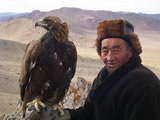
|
It is mid-afternoon in the western Mongolian countryside. Simon and I ride horses alongside Donde and his eldest son Edk. Donde's presence invokes respect. He is a stout man, with a bear-like body. I speculate about the large scar that runs the length of his cheek. Did he rescue one of his sheep from the mouth of a wolf, wrestling the wolf with his bare hands? As we later learned, the scar came from his eagle, when it swooped down onto his gloved hand, open talons accidentally coming into contact with his face. Donde is part of a tradition that stretches across millennia in this part of the world, a tradition that could easily die in the next couple of generations, if not for those like Donde's sons, who carry on the tradition of eagle hunting: a highly adapted form of hunting using eagle's to kill the prey...
Read more...
|
|
|
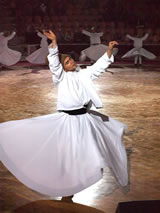
|
...What I'm getting down to is the essence of a ritual whose understanding demands time, and a certain state of mind and being. It's an understanding of an organic sense of time, not the mechanical ticking of watches but the sort of time associated with growing chin hair, or the menstrual cycle, the sort of time many backpackers, obsessed with racing through as many countries as possible, do not take the time to understand. This is a sense of time that has often been associated with the Orient. Whether that's just an illusion I don't know, but let's explore it...
Read more...
|
|
|

|
I had been mislead to believe that it was best to fish when the moon was full and the tide low, under the night sky or at the break of day. Instead it was dusk. The setting sun had stripped the color from the beach. I was sitting in the sand with my quiet friend Danilo. He had spent 20 of his 30 years on a fishing boat and had only recently begun to work at a posada instead. He set me straight when it came to fishing. "Sarah," he said, "If there are no fish it doesn't matter what time of day it is. Fishing is a matter of luck." ...
Read more...
|
|
|

|
...What I'm getting down to is the essence of a ritual whose understanding demands time, and a certain state of mind and being. It's an understanding of an organic sense of time, not the mechanical ticking of watches but the sort of time associated with growing chin hair, or the menstrual cycle, the sort of time many backpackers, obsessed with racing through as many countries as possible, do not take the time to understand. This is a sense of time that has often been associated with the Orient. Whether that's just an illusion I don't know, but let's explore it...
Read more...
|
|
|

|
"But I'm not a Hindu," I reply.
"You can take puja sir. It is all one god," incants the man sitting lotus in the sand, sandal-paste smudging his forehead, that distinctive sideways nod as he speaks, hands gestured prophetically to the heavens.
A holy man is offering me salvation on a beach in Kerala, South India, a fishing village, home to a 2000 year-old Hindu temple, and above a cliff where budget travellers swarm for cheap rooms, beer, sex, and the unobscured roar of the Arabian Sea...
Read more...
|
|
|

|
...Cabrales is not your commercial, mass-produced blue cheese. It is like beer from a local microbrewery in its craft and attention, but world-class as a product. The taste is too unique and strong to create any potential demand for mass consumption, even if the producers decided to go that route, which they do not. The cheese production is family-run, family-owned, and generations old. The festival gave off such a local and neighborly aura that I would not be surprised if the goats and sheep — from whose milk the cheese is made — had been inbred for decades. The cheese-producing entities are unflappably permanent. When external economic forces bring down the last of the corner pharmacies, small cattle ranches and independent bookstores, Cabrales will endure. For any corporation that even wanted to buy up Cabrales, the profits may not be great enough, the market may not be big enough, but above all, the passion, livelihood, and definition of the entire community is Cabrales cheese. The community would never part with it...
Read more...
|
|
|
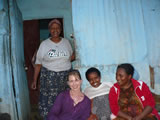
|
It was twilight on the evening of the holiest of days: Timkat, "Epiphany," in the small and ancient city of Gondar, tucked away amongst the mountains and plateaus of North Western Ethiopia. In the small neighborhood of dirt roads, small stone houses, and tiny tin kiosks, light bulbs were glowing dimly, children were playing their last games of the day outside in the street, and the sounds of chatter and laughter were coming from inside the small homes. I was squeezed into Birhanie's tiny hut with my female neighbors, celebrating the remains of this important day...
Read more...
|
|
|
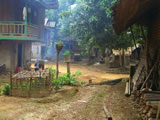
|
When night descends on Ban An the isolation feels complete. The closest village, an hour's walk away, may as well not even exist. The gas lamp on the wooden table casts a glow across the side of Kem's face as she works on the strap of her sandal, the small tube of epoxy in her hand looking very much out of place here in this primitive oasis of civilization. Animals bellow and grunt in the darkness. Hushed words drift in and out from somewhere unseen; voices of children, not at play but at task. The cooling air smells faintly of earth...
Read more...
|
|
|
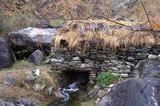
|
Travel for travel sake is fine. But travel takes on a new dimension when combined with a purpose, as Thommen Jose finds out from his journey to Pauna, an unknown mountain village 30km by foot from the last motorable point in Chamoli, Uttarakhand in India...
Read more...
|
|
|
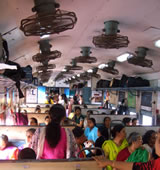
|
Despite the astonishing amount of travel literature on India, very little has been written about the massive, lumbering system that connects its various limbs: the railways. It is my firm belief that to truly traverse India, you must travel by her trains. While traveling by trains, differences of class, caste, and religion are, often reluctantly, suspended. Watch people on a train closely enough, and the culture and ethos of various parts of India can be easily discerned. Trains also mirror the inexplicable, and often overly frustrating, mystery that is this nation...
Read more...
|
|
|

|
The ongoing conservation efforts taking place in the wondrous Iguassu Falls in Brazil and Argentina...
Read more...
|
|
|
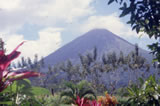
|
...My sister Jean and I are in Costa Rica as volunteers under the auspices of the Costa Rican Humanitarian Foundation, run by dynamic former Peace Corps volunteer Gail Nystrom. She offers opportunities for insight into aspects of "Tico" life for her assorted volunteers, of whom we are by far the eldest. Our shamanic evening is only one of several extra-curricular activities we enjoy...
Read more...
|
|
|
|
|
|
Many international volunteers, especially those from North America, find Mexico and Central America to be inviting and exciting places to serve. Easier and cheaper to get to than Africa and Asia, this region offers a huge range of volunteer opportunities from working with street children in Mexico City to counting butterflies in the rainforests of Cost Rica... Read more...
|
|
|
|
|
|
South America is a continent with many needs. As a result, there are a large number of NGOs and volunteer service organizations all over the continent involved in helping the development of their countries. These organizations perform a huge variety of tasks, from protecting animals and ecosystems to providing vaccinations to indigenous tribes and teaching art to poor urban children. If you are interested in volunteering in South America, opportunities are not lacking...
Read more...
|
|
|
|
|
|
Lying 600 miles off the coast of Ecuador, situated right on the equator in the Pacific, is one of the world's strangest archipelagos. Groups of birds, reptiles, and mammals somehow made their way from the mainland of South America to these new (in geological terms) volcanic islands, where they evolved over time with traits that are unique to this location. Above and below the water, what seems like an inhospitable landscape to the naked eye is actually teeming with life, thanks to a convergence of currents underwater and a temperate year-round climate on land...
Read more...
|
|
|
|
|
|
Few world travelers do not have Ecuador's Galapagos Islands near the top of their vacation life list. It is an iconic destination rightfully designated as one of the earliest United Nations UNESCO natural world heritage sites. While I suspect it will always be among the most fragile ecosystems in the world, the good news is that UNESCO's heritage watchdog committee agreed to remove the Galapagos Islands in August 2010 from an uncomfortable three-year placement on the committee's "sites in danger" list...
Read more...
|
|
|
|
|
|
|
Travelers are often on the hunt for places off the tourist trails in search of a slice of local life. But "off the beaten path" locations can be tough to find, especially if you stay in hostels or hotels which are designed to be on such paths. If what you want is to live like a local — with the added benefit of staying somewhere for free — then house-sitting could be just what your next vacation calls for...
Read more...
|
|
|
|
|
|
If you want to find out how to travel cheaply the best person to ask is Nora Dunn. A former financial planner, Dunn is the author of 10,001 Ways to Live Large on a Small Budget. She also writes about small-budget travel and living at Transitions Abroad and Wisebread and says that it’s possible to travel full-time for less than $14,000 per year.
Dunn practices what she preaches. With unique money-saving techniques such as traveling slowly, house sitting for accommodation, and novel discount plane ticket search techniques, Dunn has managed to visit 21 countries on five continents over the past 3.5 years and is still going... Read more...
|
|
|
|
|
TAzine is a monthly Webzine which continues the 30-year tradition started by Transitions Abroad magazine. TAzine features many of the same columnists
who wrote for the magazine, a growing group of new columnists, while featuring many freelance writers who wish to share their experiences and expertise within the context of our innovative alternative coverage of work, study, travel, and living abroad.
Founded in 1977 by Dr. Clayton Allen Hubbs, Transitions Abroad magazine was the only print publication dedicated to work, study, living, volunteering, and immersion
travel abroad. Its purpose — in print and now as a Webzine — is the dissemination of practical information leading to a greater understanding of other cultures through direct participation in the daily life of the host community.
TransitionsAbroad.com will be expanding upon the material covered in each monthly
edition. We will be working on developing each issue with a specific focus — be it regional or thematic — and are seeking contributions from professional and freelance writers alike.
|
Current Issue and Focus
Narrative Travel Writing Contest Winners and Latin America Volunteering, Travel, Study, and Work and Living
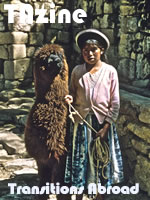
|
Previous Issue and Focus
Travel, Study, Work, Volunteering, and
Living Abroad in Europe

|
|
To view all TAzine back issues, see our archive.
|
|
|
|
